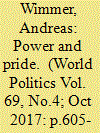| Srl | Item |
| 1 |
ID:
155594


|
|
|
|
|
| Summary/Abstract |
Why do some individuals embrace nationalist rhetoric and feel proud of their citizen ship while others do not? This article introduces an exchange-theoretic perspective, according to which national pride depends on access to political power. Seen from this perspective, members of ethnic groups that are not represented in national-level government should be less proud of their nation than those included in the polity. Furthermore, ethnic violence in the past or power-sharing arrangements in the present should reduce trust in the future stability of political representation and thus pride in the nation. From a dynamic point of view, members of ethnic groups whose level of political representation decreased in the past should also see their nation in a less positive light today. To show this, the author uses existing surveys to assemble a new dataset with answers to a similar question about national pride. It covers 123 countries that comprise 92 percent of the world's population. For roughly half of these countries, the ethnic groups listed in the surveys could also be found in another data set that contains information on the political status of these groups. Multilevel ordered logistic regressions at both the country and the group level confirm these hypotheses while taking into account a wide range of individual-level and country-level variables discussed in the existing literature.
|
|
|
|
|
|
|
|
|
|
|
|
|
|
|
|
| 2 |
ID:
155596


|
|
|
|
|
| Summary/Abstract |
What is the nature of religion and state relations in authoritarian regimes? How do religious and regime actors negotiate the terms of their relationship;what do the two sides want from one another; and how cooperative or conflictual are their interactions? To address these questions, the author compares religion-regime relations in contemporary Russia and China—two autocracies with long histories of religious repression, diverse religious profiles, and distinct relations between religion and the state. The article introduces a new theoretical framework anchored in interests and subnational authoritarian politics to explain how religious and political authorities negotiate their relationship and the constraints and opportunities that shape their interaction. Although there are many reasons to expect different types of religion-regime relations across Russia and China, the data demonstrate that subnational governments and diverse religious actors often forge innovative partnerships to govern more efficiently, gain access to resources, and safeguard their survival.
|
|
|
|
|
|
|
|
|
|
|
|
|
|
|
|
| 3 |
ID:
155595


|
|
|
|
|
| Summary/Abstract |
Several recent studies link rising income inequality in the United States to the global financial crisis, arguing that US politicians did not respond to growing inequality with fiscal redistribution. Instead, Americans saved less and borrowed more to maintain relative consumption in the face of widening economic disparities. This article proposes a theory in which fiscal redistribution dampens the willingness of citizens to borrow to fund current consumption. A key implication is that pretax inequality will be more tightly linked with credit in less redistributive countries. The long-run partisan composition of government is, in turn, a key determinant of redistributive effort. Examining a panel of eighteen OECD democracies, the authors find that countries with limited histories of left-wing participation in government are significantly more likely see credit expansion as prefisc inequality grows compared to those in which the political left has been more influential.
|
|
|
|
|
|
|
|
|
|
|
|
|
|
|
|
| 4 |
ID:
155597


|
|
|
|
|
| Summary/Abstract |
Settlers flocking to boomtowns on the American western frontier were faced with the same task that communities in weak states across the globe face in contemporary times: self-governance. Peer sanctions can enforce cooperation in these environments, but their efficacy depends on the social networks that transmit information from peer to peer. The author uses a game-theoretic model to show that peripheral network positions can generate such strong incentives to misbehave that persistent cheating occurs in equilibrium. The model reveals that groups maintaining high levels of cooperation that face shocks to their strategic environment or to their network can ratchet down into less cooperative equilibria in which the most peripheral become ostracized. Furthermore, population change that features rapid growth, high turnover, and enclave settlements can undermine cooperation. The insights from this article help to explain the trajectory of cooperation in the mining towns of the Wild West in which high levels of cooperation deteriorated as the population surged, and help to make sense of why only certain nonwhite settlers were targets of hostility and racism.
|
|
|
|
|
|
|
|
|
|
|
|
|
|
|
|